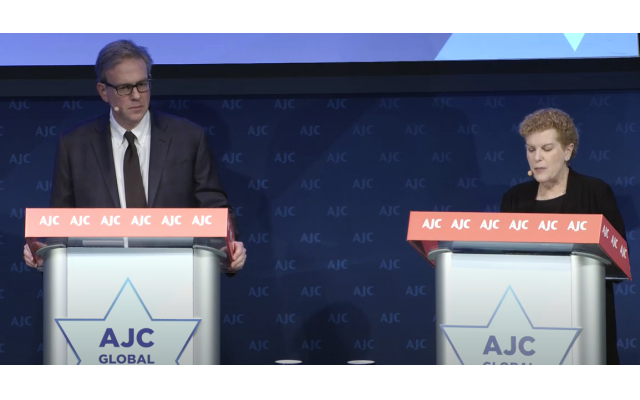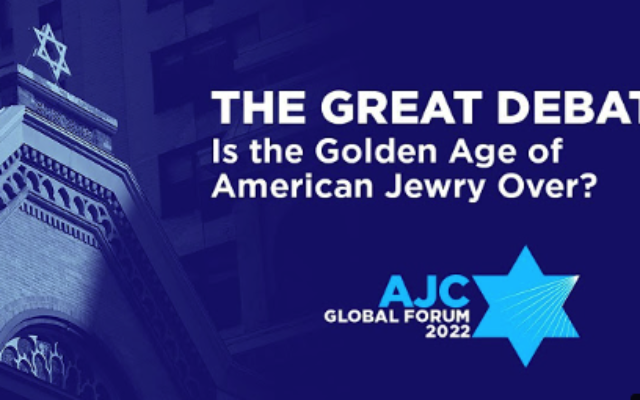Is the Jewish ‘Golden Age’ Over?
Bret Stephens and Pamela Nadel debated the issue of the Jewish future at the American Jewish Committee’s annual Global Forum.

On June 14, the American Jewish Committee (AJC) closed out its annual three-day Global Forum with a provocative debate about the future of Jewish life in America.
The debate, titled “The Great Debate,” brought together two influential observers of Jewish life in America to respond to the question: “Is the Golden Age of American Jewish Life Over?”
Taking an optimistic view was Pamela Nadell, a distinguished professor of Jewish Studies at American University in Washington, D.C., and a former president of the Association of Jewish Studies. She maintained that the so-called “Golden Age” that began an upward trajectory for American Jews following World War II would continue.
The fact that this debate took place before more than a thousand members of the American Jewish Committee who attended the conference at Congregation Emanu-El in New York City may be one indication of that vitality.
Responding to Nadell was Bret Stephens, a Pulitzer Prize-winning journalist for the New York Times and editor of SAPIR: A Journal of Jewish Conversations, published by the conservative Maimonides Fund. A self-proclaimed pessimist by nature, Stephens argued that the Jewish community in America was on the “edge of a precipice” that could be “facing decline or even collapse.”
At this moment, he argued, Jews are contending with a time not entirely unlike Germany in the 1920s, when life for those caught in the crosshairs of extremism was beginning to sour and where public debate became increasingly divorced from reality. Stephens is an influential conservative opinion maker who was the keynote speaker at the American Jewish Press Association convention in Atlanta this week.
At the AJC, he described the history of the contemporary Jewish diaspora as “darkness at noon.”
“Today in America, we live in a land in which seemingly sane people think that 9/11 was an inside job, that Barack Obama was born in Kenya. That the election of 2020 was stolen from the incumbent president. When people will believe anything about anything. They will believe anything about the Jews. And that is what worries me today,” Stephens said.

According to Professor Nadell, however, the answer to all the bad ideas currently in circulation is the continued development of good ideas by Jewish writers and thinkers.
She pointed to what she described as the continued influence of a new generation of Jewish intellectuals and “the flowering of Jewish studies” on university campuses. She pointed to the fact that in the last 75 years we’ve gone from a handful of scholars specializing in the examination of Jewish life to a community of 1,800 specialists teaching Jewish studies across the country and beyond.
“They don’t teach only Jewish students,” Nadell pointed out, “and this is a sign of the flourishing of our golden age. And it is not diminishing.”
Nevertheless, it is these students and what he describes as the decline in their Jewish identity and subsequent lack of commitment to the state of Israel that troubles Stephens.
“For millions of secular-minded American Jews, Israel was the glue,” he said. “Israel was the cause. Zionism was an effective and powerful and emotionally satisfying substitute for religious observance that many people found themselves leaving behind. It also says something about the nature of American Jewish emotional connections that at the height of last year’s war, so many young American Jews were eagerly signing letters denouncing Israeli behavior.”
Last November, for example, the New York Times published a lengthy examination, “Inside the Unravelling of American Zionism,” by Marc Tracy, who had once worked for the Jewish-interest magazine Tablet. Among other developments, the article mentioned an open letter signed by 93 rabbinical students in five different U.S. cities that compared the plight of Palestinians to discrimination against Black Americans and urged American Jews to rethink their support for American military aid to Israel.
But, for Nadell, disagreements like these are less a cause for concern than a sign of strength.
“Decades ago, I said that the American Jewish community, in terms of its identity, was in deep trouble because it was hanging its hat on two events external to the United States: the Holocaust and Israel. And we couldn’t sustain a community that way,” she recalled.
At least one early Zionist thought that Israel would become the “spiritual center” that all the communities of the Jewish diaspora would circle around, Nadell said, but that was never going to work.
“Anyone who knows anything about the way in which ethnic communities change and develop and shape their ethnicities over time knows that you can’t do that from an impetus from outside. It’s got to come from within.”
- News
- Local
- Bob Bahr
- American Jewish Committee
- The Great Debate
- Pamela Nadell
- Jewish Studies at American University
- Association of Jewish Studies
- World War II
- WWII
- Congregation Emanu El
- Bret Stephens
- New York Times
- SAPIR: A Journal of Jewish Conversations
- Maimonides Fund
- American Jewish Press Association
- Barack Obama
- Zionism
- holocaust



comments